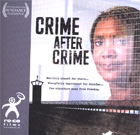
Crime After Crime 2011
Distributed by Ro*co Films International, llc, 80 Liberty Ship Way, Suite 5, Sausolito, CA 94965; 415-332-6471
Produced by Life Sentence Films LLC
Directed by Yoav Potash
DVD , color, 93 min.
Jr. High - General Adult
American Studies, African American Studies, Crime, Criminal Justice, Domestic Violence, Gender Studies, Law, Media Studies, Political Science, Social Sciences, Sociology, Urban Studies, Women’s Studies
Date Entered: 12/07/2011
Reviewed by Jennifer Dean, MALS student, City Univerity of New York (CUNY Graduate Center)Crime after Crime is a documentary in the tradition of such greats as Errol Morris’ The Thin Blue Line (1988) which absorbs the audience in an individual personal story within a larger societal context. The story follows Deborah Peagler, convicted to life-in-prison for arranging the death of her abusive husband in the early eighties. Twenty years later the case is taken up pro-bono by lawyers Nadia Costa and Joshua Safran from Bingham McCutchen LLP – thanks to a law in California allowing the introduction of evidence of domestic abuse in criminal cases. Deborah Peagler’s journey provides an emotional anchor to a film that indicts the current legal system while at the same time offering hope for the future. Yoav Potash takes the audience on a roller coaster ride of ups and downs while painting a clear picture of all of the characters involved, engaging the audience both viscerally and intellectually. More in the tradition of a straight-forward investigative documentary than The Thin Blue Line (which stylistically almost resembles a narrative feature), Crime after Crime introduces many elements, raising questions about gender and punishment, the ethics and efficacy of the prosecutorial system, the effect of domestic violence on the individual and the society as a whole, and the overall purpose of the penal system.
The film is as inclusive as possible, interviewing members of Deborah Peagler’s family, members of her murdered husband’s family, the attorneys engaged in the legal struggle, the private investigator working to find evidence to free her, and even attempting to track down the District Attorneys from the prosecuting office handling her case (although they declined to comment or provide interviews beyond the sound bites provided during Potash’s street-reporter style questioning of D.A. Steve Cooley and Lael Rubin). Potash manages to film Peagler and her attorneys during the legal process despite a California law that “does not allow the media to film the story of specific inmates” because the attorneys gave him access as a legal videographer. He also incorporates footage of Peagler in prison engaged in various activities thanks to a PBS documentary he filmed on programs in the department of corrections (no relation to this project). While Potash occasionally manipulates the situation for dramatic effect – for instance by making sure that the camera is rolling when certain information is shared – he clearly respects his subjects and the manipulation doesn’t feel overly contrived.
There is website associated with the film which provides additional information, including a timeline which juxtaposes points in Deborah Peagler’s case with critical moments concerning the battle against domestic violence in the United States (much as the film accomplishes cinematically). Crime after Crime is a wonderfully executed documentary, highly recommended for the issues it raises as well as for pure entertainment value.
Awards:
- Audience Award and Golden Gate Award for Investigative Documentary Feature at the San Francisco International Film Festival
- Justice Matters Jury Prize at the Washington DC International Film Festival
- Grand Performances Documentary Award at the Los Angeles Film Festival
- More awards are listed on the film's official website and its Wikipedia page.